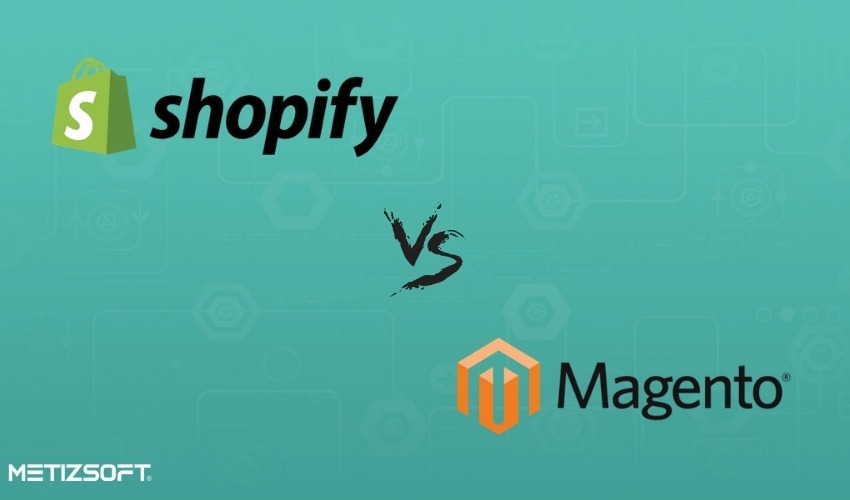
Table of Contents
Summary
Shopify vs Magento is the ultimate choice if you are looking for the best eCommerce platform in 2025. Each platform promises powerful features, flexibility, and growth for your online business. In this comparison guide, get real insights on features, costs, scalability, security, and more. If you’re still unsure which platform suits your vision, drop your thoughts in the comments or reach out to Metizsoft for a free e-commerce consultation today.
Introduction
If you plan to launch or upgrade an online store in 2025, then this Shopify vs Magento comparison guide is for you. Both these platforms hold many advanced features that make them the best e-commerce platforms among many. Their community is constantly updating these platform key prospects to give retailers and customers a soothing store management and shopping experience.
Because they understand that the digital shopping landscape is evolving rapidly. Customers now expect seamless experiences, quick delivery, and easy navigation across all devices. Retailers need tools that are easy to use, flexible to grow, and strong enough for any challenge.
Let’s dive deep into Shopify vs Magento comparisons to understand which platform stands out and what could be the best choice for you.
Quick Overview: Shopify and Magento for 2025
What is Shopify?
Shopify is a popular cloud-based e-commerce platform designed for everyone, from solo entrepreneurs to huge brands. The latest versions in 2025 come packed with new drag-and-drop design tools, native AI product descriptions, and even more payment options.
Shopify handles your hosting, security, and updates in the background to help you focus on selling your product. If you want an all-in-one solution without technical headaches, Shopify is a top choice.
What is Magento (Adobe Commerce)?
Magento, now known as Adobe Commerce for its enterprise edition, is an open-source platform that offers unmatched flexibility. New updates in Magento and Adobe Commerce for 2025 include faster loading times, stronger security, and direct integrations with the Adobe suite.
Magento is perfect for those who want total control of their store, think custom layouts, advanced workflows, or unique shopping experiences. With the right Magento solution provider or expert developer, you can start a rock-solid online store in the long run.
Shopify vs Magento: Feature-by-Feature Comparison
Ease of Use and Store Setup
Shopify: Shopify’s setup remains famously smooth in 2025. Most users launch a store in minutes with preset templates and real-time guides. No need for coding knowledge. The interface is clear and clean. Shopify also helps with product imports, menu setup, and connecting your domain.
Magento: Magento has improved its onboarding, but setup is still more complex than Shopify. You’ll need some tech skills, especially if you self-host Magento Open Source. Adobe Commerce’s cloud version makes things easier, but many store owners choose to hire Magento experts to get started properly.
Customization, Design, and Flexibility
Shopify: Shopify now boasts hundreds of fresh themes, including mobile-first designs and video backgrounds. You can tweak layouts using drag-and-drop and some CSS/HTML, but deep changes are limited. Most users rely on apps from the Shopify App Store for added features.
Magento: Customization is where Magento shines. You can build almost any storefront or feature you imagine. From one-of-a-kind product pages to custom checkout flows, Magento is your playground.
Pricing and Total Cost of Ownership (TCO)
Shopify Pricing: Shopify offers monthly plans, starting from $39 for basic stores. The most popular plan (Shopify) is $105/month, and Advanced Shopify is $399/month.
Transaction fees range from 2.6% to 0.5%, unless you use Shopify Payments. Hosting, SSL, and support are included.
Magento Pricing: Magento is free to download, but you will incur costs for hosting (starting at $30 per month for small stores), security, and development.
Adobe Commerce (cloud) is priced based on revenue, starting at approximately $2,000 per year. Total costs depend on store size, traffic, and whether you hire Magento developers for maintenance.
Scalability & Performance
Shopify: Shopify can handle small stores and massive product catalogs alike. Shopify Plus (the enterprise tier) is designed for bigger brands with high traffic and complex needs. With fast global servers and automatic scaling, your store stays speedy.
Magento: Magento powers some of the largest online retailers, thanks to unlimited catalog size, advanced caching, and powerful APIs. You’ll need solid hosting and expert help as you grow. But for brands with custom logic or multi-warehouse setups, Magento is hard to beat.
Security & Compliance Features (PCI, GDPR, etc.)
Shopify: Shopify is PCI-DSS Level 1 certified. All stores come with SSL, fraud detection, and regular security updates. GDPR tools and privacy settings are built in.
Magento: Magento offers robust security, but it’s your job or your Magento service provider’s to keep software updated and apply patches. Adobe Commerce includes managed security, PCI compliance, and advanced privacy controls.
SEO & Marketing Capabilities
Shopify: Shopify has enhanced its SEO tools in 2025, including built-in sitemaps, editable URLs, image optimization, and speedy page loads. The app store features marketing integrations for email, SMS, and social media ads. Shopify Flow automates campaigns and abandoned cart emails.
Magento: Magento lets you customize every SEO element: meta tags, redirects, advanced URL structures, even headless integration with content platforms. Its marketplace covers every marketing need, including AI recommendations and multilingual campaigns.
Customer Support & Community
Shopify: Shopify offers 24/7 support by chat (AI bots) and manual chat, email, and phone. The help center is full of guides and community tips. Shopify’s partner agencies offer local support in most countries.
Magento: Adobe Commerce provides enterprise-level support, including a dedicated manager and training. Open-source users rely on a vast global community, forums, and expert agencies.
Payment Gateways & Integrations
Shopify: Shopify Payments works out of the box in most regions, supporting Apple Pay, Google Pay, and more. Over 100 external gateways integrate via the admin panel. Hire Shopify developers to integrate your selected payment gateways into your Shopify store!
Magento: Magento supports a vast array of payment options and custom integrations, making it perfect for international or B2B brands. It plays nicely with nearly any gateway, ERP, or shipping provider.
Shopify vs Magento: Pros and Cons
Shopify
| Pros | Cons |
| Very easy to use | Limited deep customization |
| Quick store launch | Extra fees for external gateways |
| All-in-one hosting & security | App costs can stack up |
| Rich app ecosystem | No true multi-store setup |
| Mobile-optimized themes | Some SEO restrictions |
Magento
| Pros | Cons |
| Complete customization control | Steeper learning curve |
| Free Open Source edition | Needs quality hosting |
| Grows with your business | Maintenance and updates are needed |
| Powerful B2B & multi-store | Costly for small stores |
| Flexible SEO & integration | Fewer ready-made apps |
| Huge developer community | Self-managed compliance |
Which is Best for You Between Shopify and Magento?
Shopify: Best for Startups & Small Businesses
If you want to start quickly and do not have technical skills, Shopify is a smart choice. It is also ideal for testing new product ideas or for companies running on limited budgets. With the built-in E-commerce solution, easy marketing equipment, and reliable support, Shopify lets you focus on your products, not on your technology. You can hire Shopify experts to unlock the platform’s full potential!
Magento: Best for Mid-size & Enterprise Solutions
Magento is best for established brands and companies with complex catalogs, special customer journeys, or unique business rules. It’s a top choice if your team needs advanced integration with ERPs or CRMs, or if you’re building out multiple storefronts under one roof.
Case Studies: Successful Brands Using Shopify & Magento (NEW)
Shopify Success Story
Gymshark started as a small UK-based training brand. By using Shopify’s scalable tools, simple checkouts, and global infrastructure, Jimshark increased from a domestic business to a multimillion-dollar company. His store is now handling Flash sales and products evenly for fans around the world.
Magento Success Story
Helly Hansen the Norwegian sportswear giant, powers its international e-commerce through Magento (Adobe Commerce). They take advantage of Magento’s deep customization to offer multi-language support, regional catalogs, and unique product experiences for global customers.
Final Verdict: Shopify or Magento in 2025?
Both Shopify and Magento are top-tier eCommerce solutions in 2025. However, your best fit depends on your business goals, budget, and need for customization.
- Choose Shopify if you want fast, simple, and secure selling—no tech skills needed.
- Choose Magento if you need total control, advanced features, or plan to scale a complex operation.
For expert advice on the best platform for your next chapter reach out to Metizsoft for a personalized consultation and platform recommendation. We are a top-rated Shopify development agency and Magento service provider ready to help you thrive online.
FAQs
Which is faster: Shopify or Magento?
Both platforms offer fast performance, but Shopify is speedier out of the box. With good hosting and expert setup, Magento can match Shopify’s speed, even for large catalogs.
Can Magento scale as easily as Shopify?
Yes! With the right hosting and developer support, Magento scales to handle thousands of products and customers all over the world.
Is Magento still relevant in 2025?
Absolutely. Magento (Adobe Commerce) is more powerful than ever, especially for businesses needing unique features or deep integration.
Which platform is more affordable for new businesses?
Shopify’s predictable costs and all-in-one hosting make budgeting easier for new businesses. Magento Open Source is free but has extra development and hosting expenses.
What are the good alternatives to Magento?
Yes, besides Shopify, other Magento alternatives for 2025 include BigCommerce, WooCommerce, and Wix for certain business types.
AboutManthan Bhavsar
Related Posts
Which eCommerce Platform is the best for your business in 2023?
Starting an eCommerce business is an exciting event. When a business owner starts an eCommerce business, they have tons of...
5 Tips to Prepare your Hero Home Page for the Upcoming Black Friday & Cyber Monday!
As we know that Black Friday & Cyber Monday are around the corner, it is time to prepare your Shopify store for these...

